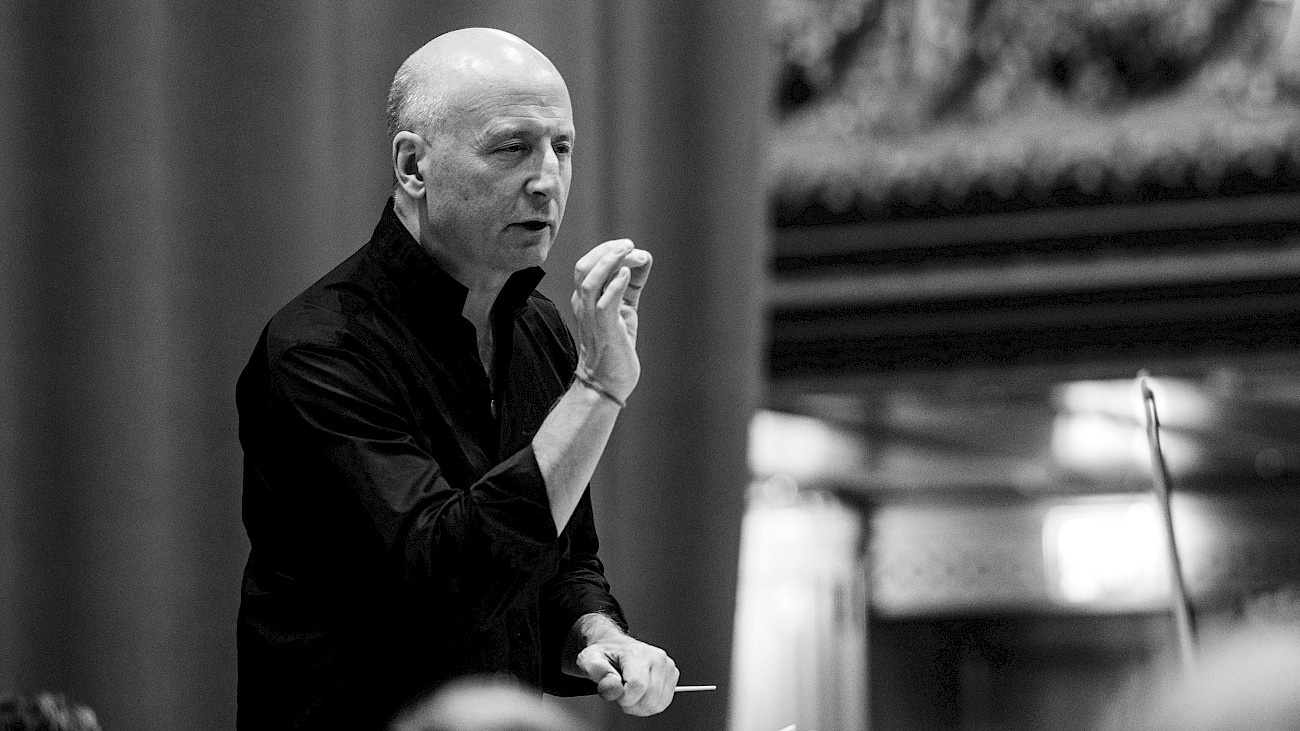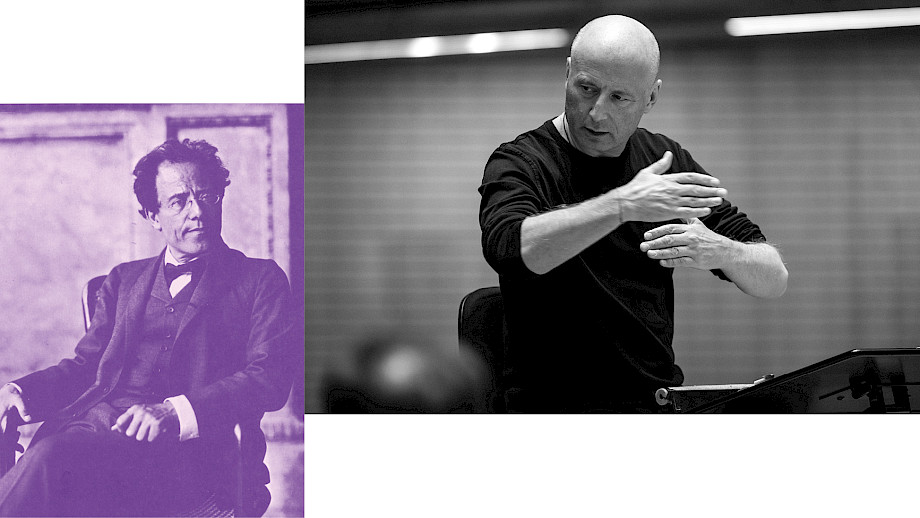
"A new universe"
In February, Paavo Järvi starts a new cycle of Mahler's symphonies with the Tonhalle-Orchester Zürich. In this interview, he talks about human donkeys, great role models – and how bored stockbrokers changed his life.
Paavo, why is now the time for Mahler?
For me, Mahler summarises the entire history of music that came before him. Many people have recognised that, Leonard Bernstein was probably the first to say it. Mahler was perhaps really the last great symphonist. We could talk about Shostakovich, about Prokofiev. And of course there are others, I don't want to deny them anything. But this kind of symphonic tradition in the German-speaking world ended with Mahler. Although the word "end" doesn't really fit: After a performance of Mahler's music, I always have the feeling that there could be another step forward, that another level could be explored - this feeling has been with me for 15 years, ever since I first did a Mahler cycle in Frankfurt. And now, with the Tonhalle-Orchester Zürich, I have musicians at my side who can really take this step. They understand this kind of depth and virtuosity and have the agogic understanding to get very close to Mahler's inner world.
What does this composer mean to you?
When I was growing up in Estonia, which was then part of the Soviet Union, Mahler was not often played. I discovered him through recordings that my father brought home. He was one of the privileged few who were allowed to travel abroad with Russian orchestras. The first thing we heard was the 4th Symphony, which I immediately fell in love with. My father brought many versions with him, so we listened to it again and again – initially just the first movement. I realised how differently different conductors played the rallentando at the beginning. I remember George Szell and Fritz Reiner, Karajan and Bernstein, Furtwängler. I discovered Mahler live when I was already in the USA and studying at the Curtis Institute of Music. Suddenly I was surrounded by so much material and so much information, there were so many performances I could listen to. It was a completely different, free society. I also associate that with Mahler.
How did you then approach his music?
You can actually ask yourself this question again and again with Mahler: You can take his music at face value and say, look, this is how it's written. That's the dynamic description, that's the text. But with Mahler, a lot happens between the notes. That's the subtext. Nevertheless, the text must be studied incredibly carefully, because Mahler was perhaps the greatest conductor of his time. As a master of his craft, he knew from his own experience how to characterise the score from a conductor's point of view. He also knew what the orchestra needed to hear and see from a conductor's perspective. He had daily experience with living, breathing musicians. That's why the first option is always to trust and go with Mahler's markings.
That sounds like there's a but?
Yes, because that's just the purely practical view. When it comes to the inner life of Mahler's music, it gets a bit more complicated. Mahler was a composer who really explored the human inner world and questioned what happens inside us. His clearly programmatic music is about that, even if he took away all the titles to make it look a bit more abstract. His music reflects the human experience of religion, love, loss, grief, absurdity and also stupidity. In at least one section of each symphony, you can feel his disdain for the donkeys in the human zoo. But maybe I'm being too hard on the donkeys ... In any case, the depth of his inner world is simply astonishing, so nuanced and so full of pain. And at the same time, he had the ability to express joy and everything in between in his music.
Have you changed your perspective on Mahler over the years?
Yes, because I have conducted these symphonies so often. When you start to deal with Mahler's music, you have an incredible respect for the musical text of this great composer. That's why you sometimes don't dare to follow your own intuition. But I think what every performance really needs is a healthy balance between the greatest respect for the original and trust in one's own intuitive understanding of this music. I now think that Mahler's inner dialogue needs time. Accordingly, my interpretations have probably become a little slower over the years and in some respects a little more desperate - and in euphoric moments a little more exuberant.
Kubelik, Karajan, Klemperer, Bernstein, Abbado - they all left behind important Mahler recordings; David Zinman's cycle with the Tonhalle Orchestra Zurich also caused a sensation. How should Mahler sound today?
That's an interesting question, because at the same time you have to ask yourself what our goal or duty is: Is it to preserve tradition? Is it to find something new in this music? Or do we want to somehow adapt the pieces so that they make sense to us? It's all quite tricky. If you listen to recordings by Klemperer and Furtwängler, they are fantastic Mahler interpretations from their time. But we no longer play these works in the same way. Nevertheless, I think you have to know the tradition in order to move away from it or sometimes insist on continuing it. It's important for me to know Mahler's performance history. I've listened to pretty much all Mahler recordings since I was a child. And I'm always curious when something new comes out. What is it? How does this person see it?
Mahler himself once described tradition as "sloppiness" ...
You definitely have to take a close look at tradition: Mahler himself was music director in New York and Vienna, he was very closely associated with the Concertgebouw, and yet they all play very differently. Above all, tradition should not be an excuse for a kind of intellectual laziness. The only really interesting view of a Mahler symphony is an individual one. For example, when there is a mezzoforte in the notes: The orchestra first plays what is written. My job is then to encourage them if it's an incredibly expressive mezzoforte, for example. Another mezzoforte may have a different context. So it's always about the context in which something is played.
Our Mahler cycle is planned for several seasons. It starts with his 5th Symphony. To a certain extent, this is a new beginning in Mahler's symphonies after the tetralogy of symphonies 1 to 4. How would you describe this new musical beginning?
Mahler really opens up a new universe with the Fifth. He embarks on an incredibly personal musical endeavour. Of course, the symphonies before that also have a high degree of mastery and inner dialogue. But the very nature of the military funeral opening and the tragedy, the whole idea of beginning a symphony in this way – that signals to us that something completely different is coming. And nothing like the Adagietto has ever been written before. For me, it is the beginning of the second half of his oeuvre.
The reference to song, to the vocal, which Mahler consciously seeks in other symphonies, is missing in the Fifth. What concept do you recognise here?
Mahler uses songs as a kind of structural guiding principle, because you can identify with the songs and therefore know what the music is about. This is not the case in the Fifth Symphony, but there are still certain hints, perhaps not so obvious. There are many harmonic changes and little cadences and moments that remind you of one song or another. The vocal thinking is definitely present. The same applies to the sixth and seventh symphonies. You don't recognise any specific songs, but the subtext of what the songs could be about.
"In any case, the depth of his inner world is simply amazing, so nuanced and so full of pain."
You mentioned the Adagietto: This fourth of five movements is very famous and has developed a certain life of its own. The reason for this is Visconti's film adaptation of Thomas Mann's "Death in Venice" from 1971, which uses the Adagietto at the end and made Mahler famous as a symphonist. Why is this movement also musically important?
The Adagietto is so perfect on its own that it can even stand alone. Personally, I would never want to play it on its own, because in the middle of the symphony it's like a confession. You get the feeling that Mahler is laying everything he has on the table here: Here it is, here is my heart. The Adagietto is so powerful, honest and brilliantly organised. And the way it's written – the harp and the strings. You have this sense of perfection. The story with Visconti certainly also has to do with Leonard Bernstein. He was my teacher, he is one of my greatest heroes – also in relation to Mahler. Because he was clearly responsible for the revitalisation of Mahler's music. In his interpretation, you can hear an incredible pain, something terribly tragic, a kind of lament from the deepest part of the soul. Visconti's images fit in with this.
Do you remember a situation in your life that is inextricably linked to Mahler's music?
One of the moments I remember actually has to do with Bernstein. He was conducting in New York. We were sitting in the hall as enthusiastic students, but otherwise there was an audience that was a bit bored, mainly businessmen who had been dragged there by their wives, even though they didn't really want to be there. And then it happened: these stockbrokers started to cry, grown and seasoned men. It was an incredibly moving performance by Bernstein. And I myself internalised this moment: Okay, this is one of life's goals. I want to get to exactly this point, to become one with the music. It was as if Bernstein was inventing this music right on stage. It was so spontaneous, so dramatic, everyone felt it. It really was a life-changing moment for me.
Translated with DeepL.com






